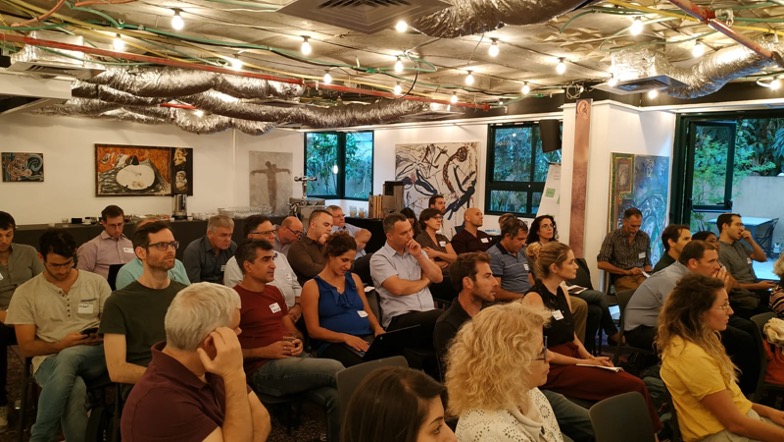En Route to Climate Goals: Accelerating Cleantech Commercialization is Key

Share this Post
Workshop in Tel Aviv: Israel’s experts on green innovation discussed how to make the high-tech nation into a cleantech nation
The year 2019 was marked by a growing recognition of the existence of a climate emergency. The rapidly increased use of the term, earning it the title of Oxford Dictionaries’ “word of the year”, reflected acknowledgement of the severity of global warming, among individuals and governments alike. Following the example of Australia, the first country to declare a climate emergency in 2016, more and more countries echoed this call in the past year, with the European Union joining the list in November 2019. The symbolic statements have also been accompanied by decarbonization strategies meant to meet the targets set in the Paris Agreement for 2030. The targets include a drastic cut of greenhouse gas emissions, an increase in the share of renewable energy, and the improvement of energy efficiency. Israel has also increased its efforts to reach these goals, emphasizing the challenging transition to a low-emission economy.
But when undertaking the numerous hurdles in Israel’s transition to a sustainable zero-carbon economy, one resource remains under-tapped – cleantech innovation. Clean technologies eliminate greenhouse gas emissions and environmental pollutants, improve environmental and social conditions, and facilitate the transition to a circular economy and renewable energy-powered energy systems. 650 Israeli companies currently work in the field, with 36 high-impact initiatives with the potential to half global emissions by 2030, being ready to be scaled up. Despite tackling a variety of issues, ranging from clean, shared modes of transportation to climate-smart agriculture, to zero-carbon buildings and renewable energy supply, many innovative solutions don’t make their way to the market.
To address this gap, IPPI and the Israel Innovation Authority (IIA) hosted an experts’ workshop titled “Accelerating Cleantech Commercialization – Key Action for Impact.” The workshop, led by IPPI fellow Dr. Diana Süsser, brought together some 50 stakeholders from start-ups, industry and investment firms, civil society organizations, and the government to discuss key challenges and solutions for vitalizing the Israeli cleantech ecosystem.
The workshop began with four input presentations stressing the potential of technological and social innovations for delivering on climate and sustainable development goals, by Dr. Süsser, Gil Shaki of the IIA, Ayelet Ben Ami from the Ministry of Environmental Protection, and Benny Cohen from the Israeli Green Building Council. The four presentations converged when arguing that in order to scale up cleantech and realize its potential to tackle environmental challenges, Israel must expand its focus beyond R&D and also support the piloting and broad diffusion of already available solutions.
Dr. Süsser presented her research on how to accelerate cleantech commercialization for climate action and sustainable development, stating that a mix of specific innovation incentives and environmental regulatory policies could increase the market demand for cleantech even in conservative industries. Furthermore, expanding impact and growth funding can provide the capital needed along the innovation cycle and thus help start-ups survive the so-called financing “valley of death.” Another strategy to overcome the problem of missing customers and aid start-ups in entering the market is to increase strategic public-private partnerships, as well as business-to-business collaborations. Last, and most importantly, a strong climate leadership, which could, for example, involve an ambitious climate action plan, could create more buzz and boost the reputation of Israeli cleantech firms, resulting in increased demand for the development and deployment of cleantech solutions.
In small roundtable discussion groups, the workshop participants debated the following in more detail: the potential financing mechanism to help advance cleantech initiatives past the pilot stage, the most effective actions governments may take to support the scaling of such initiative, and the best way to establish multi-stakeholder collaboration within the Israeli cleantech ecosystem. One key conclusion was the need to create a cleantech hub in order to promote Israel’s already outstanding technologies. Israeli success stories need to be publicized to boost Israel’s reputation as not only a high-tech nation but also as a cleantech nation.
Another necessary measure is to create a platform where Israeli cleantech companies and potential investors can connect. The ability to identify innovation gaps and demand for a problem-driven approach will be central to further development of the cleantech industry, the experts stressed.
The importance of increasing cleantech financing opportunities, via overseas funding such as corporates, for example, as well as shifting focus towards growth funding were two other important outcomes of the discussion. Government action can also advance the industry by providing incentives and developing regulations to lower costs for innovative environmental technology companies. Strategic collaborations with entities such as municipalities were also mentioned as potentially highly effective in bringing innovative ideas from the labs to the markets.
Overall, the workshop provided a unique platform for Israeli stakeholders to come together, exchange views, and network. The next step, suggested the participants, in addition to creating topic-specific forums for discussion within the Israeli cleantech ecosystem, may include partnering up with international stakeholders and experts.
Share this Post

AI and Elections – Observations, Analyses and Prospects
Artificial intelligence (AI) is one of the key technologies of the 21st century and a backbone of the…

What are Filter Bubbles and Digital Echo Chambers?
Many experts are concerned that the curation of content on social media platforms limit our chances of encountering…

Are Facebook and Its New Oversight Board Up to the Task When It Comes to Health Misinformation?
With much fanfare, Facebook’s newly established Oversight Board recently released its first batch of decisions on the social…
